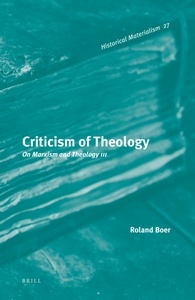Roland Boer, University of Newcastle, Australia
Criticism of Theology provides a detailed and critical commentary on the continued fascination with religion by yet more significant Marxist philosophers, historians and critics: Max Horkheimer, E.P. Thompson, G.E.M. de Ste. Croix, Michael Löwy, Roland Barthes, Gilles Deleuze, Felix Guattari and Antonio Negri. Simultaneously critique and construction, Criticism of Theology carefully analyses their work through close textual readings, with a view to locating hidden gems that may be developed further. The book continues the project for a renewed and enlivened interaction between Marxism and religion, being the third of five volumes in the Criticism of Heaven and Earth series.
Biographical note
Roland Boer, Ph.D. (1993) in Biblical Studies, McGill University, is Research Professor at the University of Newcastle, Australia. He has published extensively in theology, Marxism, biblical criticism and political theory. His most recent works are Criticism of Religion (2009), Political Myth (2009), Political Grace (2009) and Criticism of Heaven (2007).
Readership
All those interested in critical theory and philosophy, Marxism and religion, as well as biblical studies and theology.
Reviews
“A great philosopher once wrote that ‘some books are to be tasted, others to be swallowed, and some few to be chewed and digested’. The five volumes of Roland Boer’s magisterial series Marxism and Theology may well be all three.”
Matthew Sharpe, Arena Journal, No. 41/42, 2013: [28]-58.
Table of contents
Preface
Introduction
1. The Superstitions of Max Horkheimer
Religion as resistance
Longing for the totally other
The founder
On freedom and the individual
Atheism and resistance
Honest religion
Religion betrayed
The state
On the Jewish state
Liberal theology
Religion in the bad sense, or, the dialectic of evil
Conclusion: Modalities of the dialectic of religion
2. The Dissent of E.P. Thompson
Corrupt parsons and the impetuous Irish
The ‘psychic terror’ of Methodism
Religious terrorism
Moral machinery
Political reaction
Radicals in the ranks
The ambivalence of the Methodists
William Blake and the politics of radical dissent
Antinomianism, or, justification by faith
Muggletonian Marxists
Radical dissent
Poetry and apocalyptic
Anti-nuclear
Political Christmas
Conclusion
3. The Zeal of G.E.M. de Ste. Croix
The politics of style
Theology
Chora versus polis
From chora to polis: property, slavery and women
Assessment
Fall narratives
On contradiction
Religion as primary cause
… And history
Class
Trade and property
Mode of production
Conclusion: Ste. Croix among Marxists and theologians
4. The Alchemy of Michael Löwy
Elective affinities
Emergence
Untidy corners and sexy dialectics
Liberation theology
Roman-Catholic social teaching
The ontological reserve
One or many?
Conclusion
5. The Myths of Roland Barthes
Between description and accusation
Basics
Baleful deformations of language
Desperate resistance
Dialectics of opposition
Hiding something?
Producing and concealing opposition
Preserving rebellion
The cunning of myth
Alternative myths
Towards utopia
Conclusion
6. The Flights of Gilles Deleuze and Félix Guattari
Going tribal, or, primitive pre-signifiers
Numbers and nomads, or, the counter-signifying régime
In bed with the despot, or, the signifying régime
The scapegoat’s arse
From outside to inside
Oriental despots
On the tail of the scapegoat, or, the post-signifying régime
Conclusion
7. The Radical Homiletics of Antonio Negri
Radical homiletics
Philosophical commentary
Kairós and ákairos
Measure and immeasure
The olitics of cosmogony
Negri’s aporia
Excursus on the Messiah
Back to the whirlwind
Conclusion
Conclusion
References
Index

